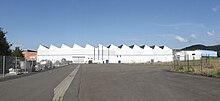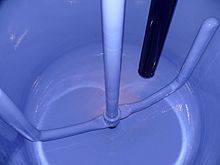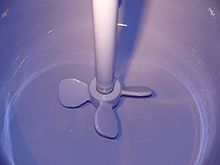Benutzer:JurecGermany/THALETEC






Thaletec GmbH (written as: THALETEC GmbH) in Thale in the Harz region is a successor company to the former ironworks, VEB Eisenhüttenwerk Thale, which employed more than 7500 staff until the so called Wende in der DDR. Today Thaletec is one of two manufacturers of glass-lined process equipment in Germany which is coated with Engineered Glass Linings.
History
BearbeitenIn 1835 following the initiative of J. C. W. Bennighaus an Email production plant was founded in Thale. Thus began a part of the business whose products were to enjoy a well-deserved internationally acknowledged reputation for the enamelled products manufactured in the Thale ironworks under the brand name Löwen-Email (lion enamel) and from which developed the oldest and largest enamelling plant in Europa. The casing of the Topf was precast from forged Blech and then riveted to the barrel frame. The fittings, such as handles and grips, were also riveted to the barrel frame and lid. The connection of the cylindrical elements was notched and the barrel enamelled on the inside only. A black protective coat was applied to the outside of the barrel.
In 1900 a large-scale welding plant in the Thale AG ironworks developed from the early application of autogenous welding from the construction of kegs, in which predominantly sheet metal was processed from the company's own rolling mill. At that time the Thale AG ironworks already included a Siemens-Martin steel works, several rolling mills, the die-cutting and enamelling works and a foundry.
In 1907 an enamelling works joined the large-scale welding works. There until the 1920s large vessels enamelled inside were predominantly produced for the drinks industry, such as ring and screw tanks, fermenters, bottling equipment and storage tanks for use in breweries.
Well into the 1920s the focus was on the production of large glass-lined vessels, mainly for the drinks industry. Ring or screw tanks, Fermentation vats, bottling equipment and storage tanks were produced for use in breweries. The EHW Thale ironworks large vessel construction division achieved a leading position in the global marketplace with its "Löwen-Email" branded products.
In 1932 Dr. Otto Krüger developed in Thale the acid-resistant enamel "Trisorit" and put it into production. Higher quality standards necessitated the redevelopment of the construction plants and improvements in welding techniques.
In 1940 the use of arc welding and x-Ray imaging of welds began in vessel construction. During the Second World War armaments orders dominated. The major part of the technical potential switched to manufacturing aircraft tanks measuring up to 50m³, Torpedo tubes, Sea mines and buoys.
In 1946 in the container and equipment construction division buckets, kegs and the first glass-lined Polymerisation kettles measuring 12m³ were produced. From the 1950s the container and equipment construction division and its products were again represented at Trade Shows at home and abroad.
The EHW Thale ironworks and the town of Thale remained undamaged during World War II and were therefore of significant importance for the reconstruction in the Soviet occupation zone. From 1946 to 1953 the works were under Soviet control (SAG=Sowjetische Aktiengesellschaft or Soviet stock company). In 1946 in the container and equipment construction division buckets, kegs and the first glass-lined polymerisation kettles (12m³) were produced.
1960 onwards saw the start of production according to type and Standardization, the planning and development of an assembly line in accordance with the latest scientific and technical know-how, modern sandblasting equipment, new specialised cutting machines and a Universal UP-welding plant. The new technologies produced a comprehensive delivery programme with sales in the German Democratic Republic, West Germany BRD, to Western and South Europe and Asia. At the Leipziger Messe the quality marks Q and "Messegold" were attained. In 1968 under the leadership of Günter Kozlowski the blue highly acid and alkali resistant chemical enamel coating ACIBAS was developed.
From 1954 to 1990 the EHW Thale ironworks were a publicly-owned enterprise. Within the remit of the programme of increasing the use of chemicals in the economy, from 1960 a modern assembly line was built and modern sandblasting equipment, new specialised cutting machines as well as a UP-welding plant were introduced. In 1968 under the leadership of Günter Kozlowski the blue highly acid and alkali resistant chemical enamel coating ACIBAS was developed.
The 1970s saw the new hall constructed for small parts manufacture, the commissioning of electrical chamber and blast furnaces, a new flow path for frame production and the commissioning of the central head production. Until 1990 enamelled steel reactors and tanks for the chemical, groceries and luxury foods industries saw a high volume of sales in the GDR, West Germany, the Comecon countries, Western and Southern Europe as well as in Asia.
In 1971 the production of glass-lined cast iron equipment for the chemical industry was undertaken by the publicly-owned enterprise VEB|State owned business VEB Emailleguss Radebeul in the old tank enamelling works which continued until 1990; enamelling of reactors up to 4m³ in the hot powder process. This type of enamelling was unique during the postwar period in Germany. In 1972 new halls were completed for small parts manufacture. In the new hall of the tank enamelling works the electric chamber and blast furnaces went into operation. In 1975 a new flow path greatly simplified work processes and improved the production flow in frame manufacture.
Central head production came into operation in 1977. The prepared heads could then be finished on weld manipulators. The 1980s were characterised by the use of micro electronics, [[Robotertechnik|robot technology], research and development of more effective agitating and sealing systems for Rührmaschinen|agitated reactors and the introduction of new operational standards.
Following the so called Wende the publicly-owned enterprise VEB Eisen- und Hüttenwerke Thale was on the verge of closure. The investment backlog over decades and low productivity were contributory factors to the failure of the Treuhandanstalt to find investors for the works. In order to save the business, Ernst Albrecht, the Chair of the Supervisory Board of EHW Thale AG at the time, and the Bremen businessman Hans Henry Lamotte bought the company. For a token purchase price of one DM the company was privatised as at 1st January 1993. Both buyers undertook not to take any profits out of the company for themselves nor to profit from a future sales price.
During the 1990s great changes were taking place in container and vessel manufacturing. Manufacture switched to DIN standards.
On 28th May 1990 the publicly-owned ironworks, VEB Eisenhüttenwerk Thale, became Eisenhüttenwerk Thale AG with the container, process equipment and plant construction division. Production fell dramatically because the majority of customers from the Comecon area were not able to pay in convertible currency. The works were managed by trustees and were privatised in 1992. In 1997 Dr. Albrecht sold the remaining divisions of EHW Thale AG (EHW Thale Email GmbH and EHW Thale Sintermetall GmbH) to Schunk GmbH
In April 1997 Schunk GmbH, Heuchelheim und die Schunk GmbH, Oberhausen acquired the shares of EHW Thale AG and following the acquisition the capital stock of EHW Thale AG increased from 2.5 to 14.5 million DM.
Following the sale to Schunk GmbH in 1997 a 4-way enamelling plant was established to coat the exterior of pipes for heat exchangers for use in power stations and in the chemical industry. Further investment, such as the construction of a new enamelling laboratory focused on products for the chemical sector and pharmaceuticals. From 2006 to 2007 redundant buildings in the old die-cutting and enamelling works, the old transformer house and Hall 7 were demolished and this land was released. When in 2007 the division moved out of the red, Schunk GmbH sold it to three private investors, who founded the company, THALETEC.
Comprehensive documentation about the history of the ironworks, Eisenhüttenwerk Thale, can be viewed in the ironworks museum, Hüttenmuseum Thale.
Current Situation
BearbeitenSince October 2007 THALETEC GmbH has maintained the tradition of enamelling equipment and components for the chemical and pharmaceutical industry at the Thale site. This includes the production, inter alia, of glass-lined reactors and storage tanks, agitators and agitator systems, columns and pressure filters as well as heat exchangers and heat exchanger tubes. Two large low-mass furnaces facilitate the enamelling of equipment of up to 110,000 l in volume.
Today Thaletec is a legally independent company, which is continuing the tradition of enamelling equipment and components for the chemical and pharmaceutical industry at the Thale site. The processes and technologies used today are based mainly on the (modernised) continuation of the technologies developed and introduced in the 1970s to the 1990s and used successfully since then to produce glass-lined equipment.
The focus of the company today is the production of vessels and process engineering equipment tailored specifically to the customers' requirements in accordance with all current applicable standards and guidelines as well as a comprehensive range of services related to glass-lined equipment. Today the company supplies its products internationally to a wide range of customers from the chemical and pharmaceutical industries. Since THALETEC GmbH was founded a number of innovations have been launched on the market, for example, the particularly wear-resistant glass lining, ABRISIST, an especially fast responsive temperature-measuring probe and special agitating systems for highly complex chemical processes and gassing functions. Furthermore, additive manufacturing processes (3D‑printing) for glass-lined components are playing an increasingly important role in the product range of THALETEC GmbH.
The company philosophy is epitomised by the slogan Made in Germany – most of the Value adding in the development and manufacture of glass-lined equipment takes place at the company's site in Thale. Most supplies come from Germany and to a lesser degree from the rest of Europe.
Extensive investment in production engineering as well as in research and development, including in close cooperation with universities (e.g. Hochschule Anhalt), for example in the field of hydroabrasion and the optimisation of baffles in glass-lined reactors, should ensure the competitive advantage of the company.
Trade fair participation
BearbeitenThe key trade fair for Thaletec is the Achema trade fair which takes place every 3 years in Frankfurt, where the company exhibited back in 2009. The company also had a stand at Achema 2012 and 2015.
Museum
BearbeitenAn excellent overview of the development of the site in Thale can be found at Hüttenmuseum Thale.
Products
BearbeitenToday the main products of the company are:
- Glass-lined agitated reactors similar to DIN 28136 with jacket or half coils.
- Glass-lined special equipment for customer-specific applications
- Glass-lined equipment for the production of pharmaceutical agents
- Glass-lined storage tanks
- Kolonnen
- Wärmetauscher for installation in Rührwerksbehältern|agitated reactors, as condensers in columns or as condenserin Destillation systems
- Components for glass-lined equipment, such as agitators, baffles, valves
- Glass-lined pipes and fittings
- Pipes for energy and environmental technology e.g. for the construction of Economisern
- Testing instrumentation components to record process parameters such as temperature and [[pH-Wert|pH-value]
The key characteristic of the products is that they are enamelled using engineered glass lining.
Weblinks
Bearbeiten- Website der Firma Thaletec GmbH
- Video channel of Thaletec GmbH on Youtube with company-specific videos
- [1] Aerial view of the factory premises of Thaletec (November 2015)
Koordinaten: 51° 44′ 52,4″ N, 11° 1′ 57,6″ O
Kategorie:Montanunternehmen (Deutschland) Kategorie:Unternehmen (Landkreis Harz) Kategorie:Unternehmen (DDR) Kategorie:Hersteller von Beschichtungswerkstoffen Kategorie:Email Kategorie:Thale